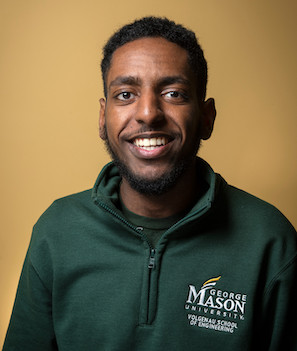Leela Yaddanapudi
When Leela Yaddanapudi talks with her female friends about joining her in pursuing computer science as a major, she doesn’t make much headway.
They prefer medical professions, she said. But they also say they fear not being able to handle the math or follow the logic the way students in the computer science field can.
“And my response is, everyone is the same,” said Yaddanapudi, a George Mason University junior. “Anyone can do what is put in front of them.”
It is that sensibility the group Minorities in Computing is trying to get across to women and minority groups that are underrepresented in the field, both at Mason and nationally.
“Every field should reflect society,” said Tessema Mengistu, an assistant professor of computer science at Mason who started the organization. “Computer science is all about problem solving, and as problem solvers we have to know the society. The only way to know the society is having it be part of the group.”
Mason, whose new School of Computing will be headquartered in a new building on the Arlington Campus, is roughly on par with national averages for women and underrepresented groups in computer science.
In 2020 at Mason, 21% of computer science degrees were conferred to women, the university reported, equal to the national percentage, according to the Computer Research Association’s Taulbee Survey. In the same year at Mason, 7% of computer science degrees went to African American students, and 6% to Hispanic students. Nationally, those percentages were 3.3% and 7.9%, respectively, according the Taulbee Survey.

Natnaell Haile
The department has a broad plan to recruit more women and students from underrepresented groups by recruiting through Mason’s ADVANCE program, creating new programs and actively recruiting from high schools.
Its goals are to increase the proportion of women undergraduate students to 33%; increase the proportion of Hispanic and African American undergraduate students to 30%; and double the number of female and Hispanic and African American undergraduates engaged in research.
“There are many careers directly centered around computing, and significant portions of our society, females and underrepresented groups, are not enjoying the opportunities to those career paths,” said David Rosenblum, a professor and chair of Mason’s Department of Computer Science. “This is a chronic problem for computing.”
Mengistu started Minorities in Computing in March.
“One of the long-term objectives is to look for internships and scholarships for these minority students,” he said. “But one thing we have to keep in mind, this is a student organization by them and for them.”
Natnael Haile, the organization’s president, said outreach will include speaking to high school students, and using video and social media to get the word out about what computer science can bring to minority communities.
“I wanted to get involved because representation in the minority community is very important to me,” the junior said. “I’m very much that person who strives to have that inclusion in our campus, and having that diversity and inclusion in whatever field it might be.”
Yaddanapudi, the organization’s secretary and a member of Mason's Honors College, concurred.
“I’ve always been passionate about increasing representation,” she said, “so it's important to start from the foundations and build up minority representation. This way, future algorithms created by underrepresented groups will not contain as much bias because everyone has equal input."
Huzefa Rangwala, a professor of computer science at Mason, said initiatives such as Minorities in Computing will help.
“Absolutely,” he said. “Students will have a community. They will see their peers working successfully, and I think there will be a snowball effect from that.”
